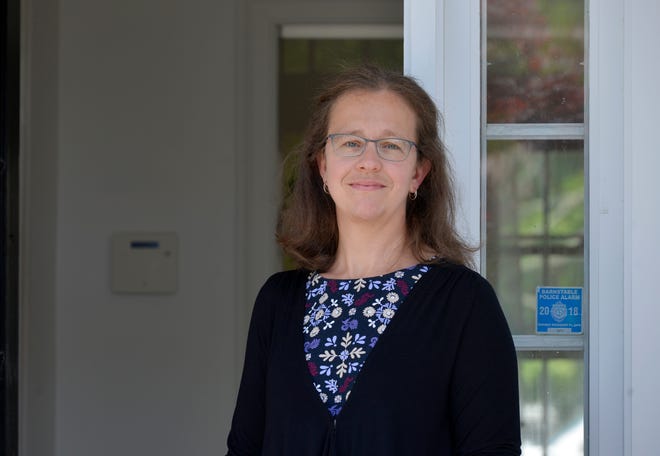Saturday open house: Current and former Hyannis residents needed for national PFAS study
Published Feb. 16, 2022
If you’re a current or former Hyannis resident wondering what health effects PFAS-tainted tap water might have caused you or your family, Silent Spring Institute researchers want to see you Saturday.
The Institute, which was the first to find PFAS chemicals in Cape Cod drinking water, is hosting an open house at its Hyannis clinic on Feb. 19 to educate people about an ongoing national study of the human health effects of PFAS contaminants in drinking water.
PFAS, or per- and polyfluoroalkyl substances, are a group of thousands of man-made chemicals, some of which have been linked to increased risk of some cancers, reduced immune system effectiveness, hormone disruption, developmental delays in children and increased cholesterol levels.
![View of Aunt Betty's Pond in Hyannis looking southeast towards Main Street in Hyannis and the harbor in October 2021. PFAS has been detected in the pond's water. [Steve Heaslip/Cape Cod Times file]](https://www.gannett-cdn.com/presto/2021/10/01/NCCT/849c30c5-9bef-4ec7-bca8-bca4dc6c8f20-100121sh03.jpg?width=660&height=355&fit=crop&format=pjpg&auto=webp)
But much remains unknown about how PFAS, which have been used in industrial and consumer products since the 1940s, can affect human health. Government agencies are now beginning to put resources into learning more.
More:Federal legislation to regulate PFAS could get House vote this month
Hyannis part of national PFAS study involving six other states
Enter Silent Spring Institute.
The organization, in collaboration with the Harvard T.H. Chan School of Public Health and Eastern Research Group, is leading a five-year study focused on two Massachusetts communities — Hyannis and Ayer — where public drinking water supplies have been contaminated by PFAS from the use of firefighting foams at nearby fire training areas.
The organization, in collaboration with the Harvard T.H. Chan School of Public Health and Eastern Research Group, is leading a five-year study focused on two Massachusetts communities — Hyannis and Ayer — where public drinking water supplies have been contaminated by PFAS from the use of firefighting foams at nearby fire training areas.
Barnstable County Fire Training Academy:Search expands for PFAS contamination
Silent Spring Institute ultimately wants to recruit 200 children aged 4 to 17 who lived in Hyannis between 2006 and 2016, and 700 adults who lived in Hyannis between 2006 and 2016. Children could also be eligible if their mothers lived in Hyannis during that time.
Researchers chose the 2016 cut-off for Hyannis residency because that year, the town installed carbon treatment systems on contaminated wells, bringing PFAS levels in town drinking water below federal health advisory limits in place at that time.
“It's important for people to know that the Hyannis water system has gone to great lengths to filter out PFAS from the drinking water, and now the water is being filtered to remove PFAS and to meet a new Massachusetts state standard that's among the strictest in the country,” said Laurel Schaider, a research scientist at Silent Spring Institute.

Researchers need study recruits now
Schaider, lead researcher for the Massachusetts PFAS & Your Health Study, is hoping for a good turnout at Saturday’s open house.
Recruitment efforts over the past year have faced delay after delay caused by the pandemic, which limited in-person outreach for months. So far, Schaider said, about 30 people have joined the study.
“We've sent out postcards to all the residences served by the Hyannis water system, and we'll be following up on those with some phone calls as well,” she said. “When things settle down with COVID and when the weather's nicer, (we) all want to be out more in person in the community.”
Time is of the essence when it comes to finding recruits for the study.
Did you live in Hyannis after 2006? PFAS researchers need your help
Though PFAS are known as highly persistent chemicals because they don’t break down easily in people or the environment, levels do decrease gradually once exposures have been reduced, Schaider said.
“We want to collect information from participants as close in time as possible to when the levels of PFAS in the water used to be high,” Schaider said. “Really, the core of the study is to understand links between the levels of PFAS in people's blood and information about their health.”
What's being asked of study participants?
Those who participate in the research will be asked to provide blood and urine samples, as well as body measurements during a visit to the Hyannis clinic, and complete a questionnaire by phone after the clinic visit. Children participating in the study will complete a neurobehavioral assessment, which includes a series of learning and memory games, during a second clinic visit.
In addition to receiving personalized reports with blood test results, participants will get gift cards ranging in value from $50 to $75 for completing all parts of the study, which is being funded by the U.S. Centers for Disease Control and Prevention and the Agency for Toxic Substances and Disease Registry.
Schaider and other staff working on the study will explain the benefits of participating and answer any questions people considering joining might have at Saturday’s open house, which will run from 11 a.m. to 1:30 p.m..
PFAS contamination:Of 21 Barnstable ponds tested, all 21 had contaminants, town report finds
Also attending is Hans Keijser, supervisor of the Barnstable Water Supply Division, who will answer questions about how town government is responding to PFAS water contamination.
“The goals for the open house are to give the community an opportunity to see our office, to meet our study staff and to get a better understanding of what it means to take part in the study,” Schaider said. “People can sign up and make an appointment to participate in the study on the spot.”

No comments:
Post a Comment
Note: Only a member of this blog may post a comment.